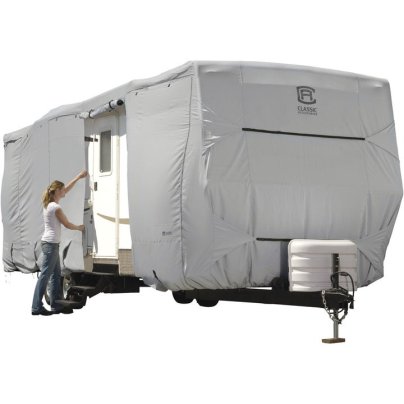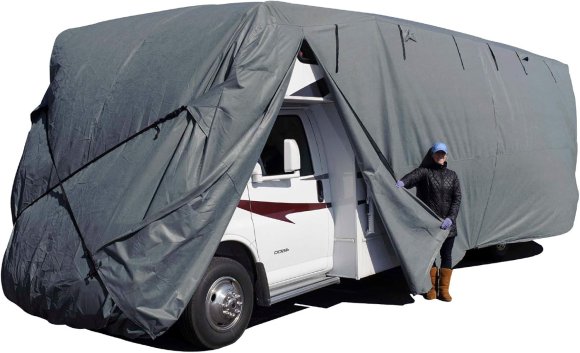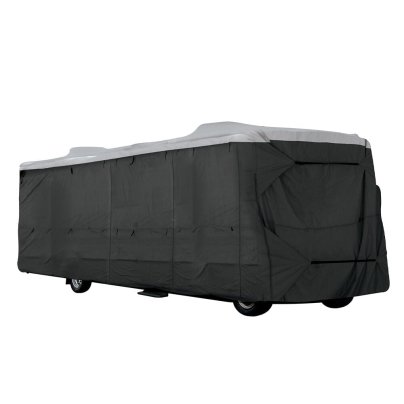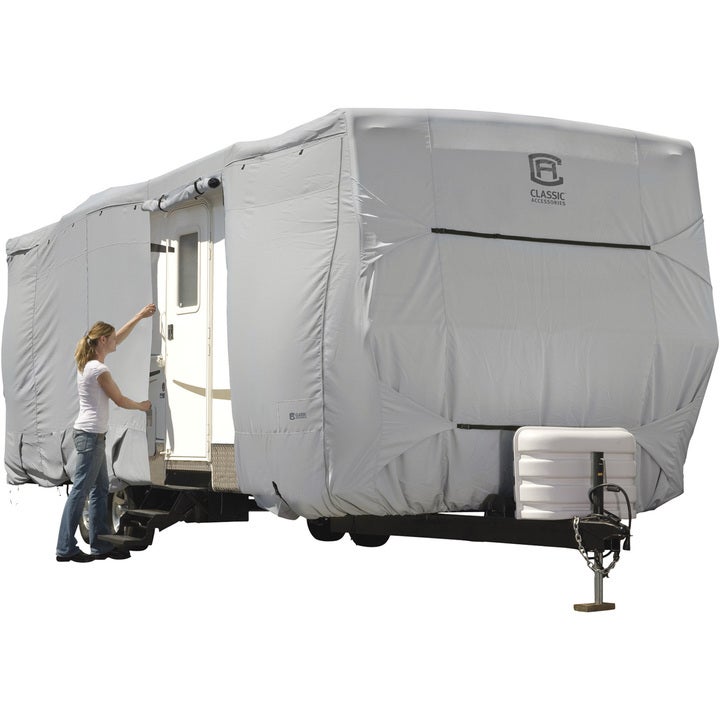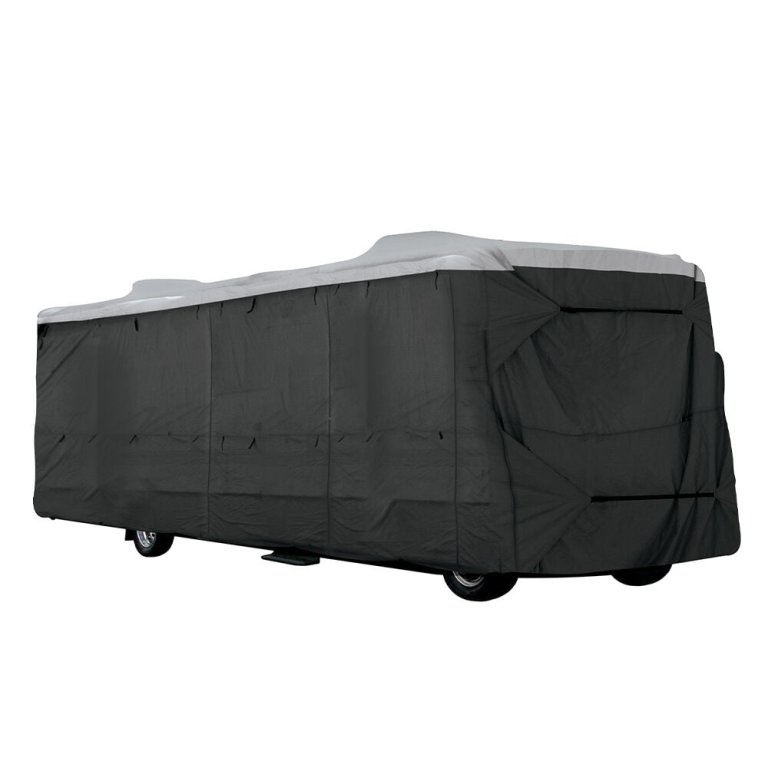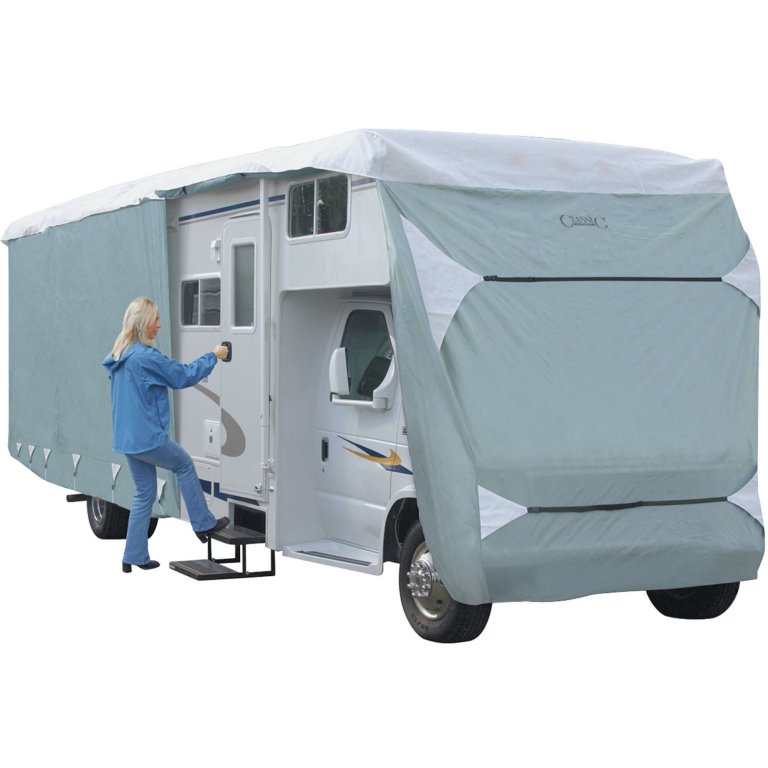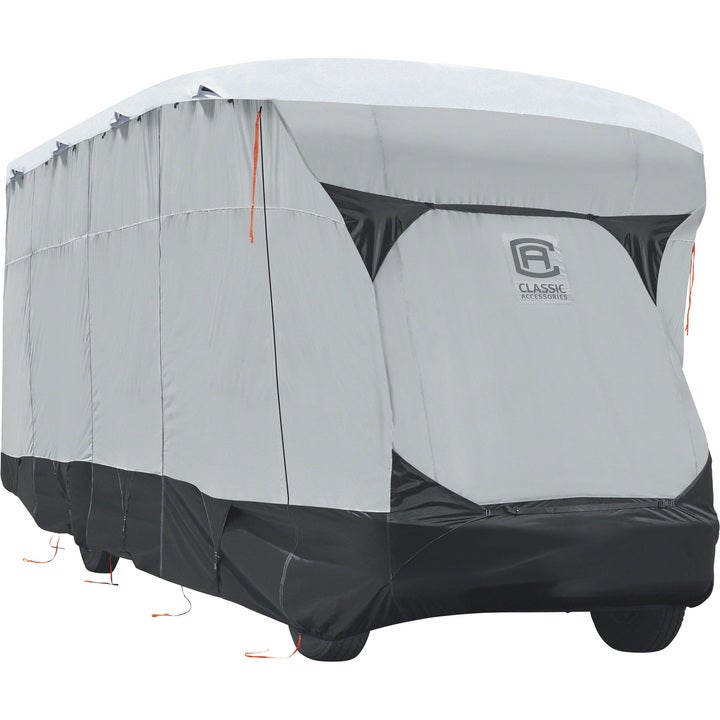We may earn revenue from the products available on this page and participate in affiliate programs. Learn more ›
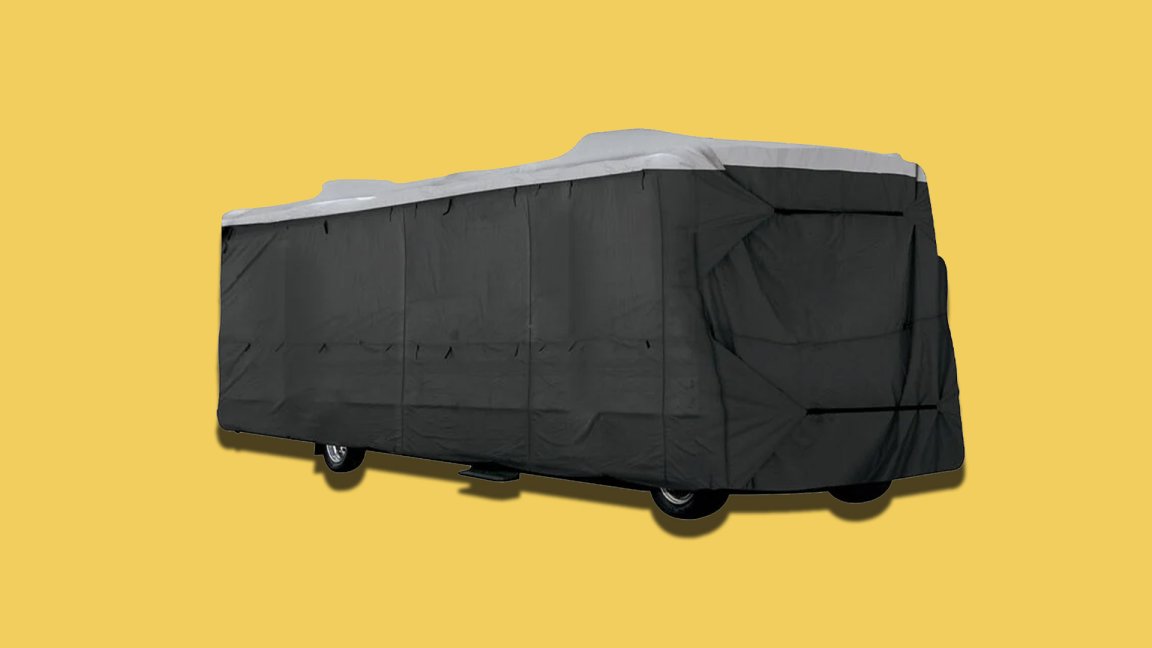
It’s no secret that your RV’s exterior takes a lot of hits, both while it’s out on the road and while it’s parked. The constant UV rays of the sun, temperature shifts and extremes throughout the year, and even deluges of rain and dirt can all make your camper age quickly, leaving you with repairs and more upkeep. Needless to say, RV covers are just as important as covers for cars, SUVs, and motorcycles, if not more so considering the difference in cost between the vehicles.
The right RV cover shields it against all of the elements. An RV cover wraps your vehicle in a blanket of protection from roof to wheels. And with the right cover, you can combat concerns like sun exposure, seasonal outdoor storage, and more. Plus, with covers available for every class, shape, and model of RV, finding an easy-to-fit cover is a breeze. Still, we’ve put this buying guide together to help you nail down the best RV cover to protect your investment.
Summary List
Best Overall: Classic Accessories OverDrive PermaPro Heavy-Duty RV Cover
Best Value: Budge Industries Standard Class C RV Cover
Honorable Mention: Camco Pro-Shield Class A RV Cover
Best Moisture-Resistant: Classic Accessories OverDrive PolyPro 3 Deluxe RV Cover
Best Easy Access: Camco Pro-Shield RV Cover
Best Heavy-Duty: Classic Accessories SkyShield Class C RV Cover
Our Methodology
The best RV covers on my list are those that are from reputable brands — brands that specialize in either RV covers or other RV, trailer, and camping gear. To choose these product picks, I compared different covers of various sizes and forms to one another, and those that offered complete coverage for common RV sizes were those I focused on. From there, I specifically looked for products that shielded campers from the sun’s rays, moisture buildup, rain and snow, and strong winds. The top picks were those that users mentioned held up best throughout varying outdoor conditions in their reviews.
Best RV Covers Reviews & Recommendations
Best Overall: Classic Accessories OverDrive PermaPro Heavy-Duty RV Cover
Pros
- All-weather protection
- Adjustable tension panels
- Zippered panels provide easy access
- Includes repair kit and zippered storage bag
Cons
- Requires two people to put on
When it comes to a well-rounded, durable RV cover, the Classic Accessories OverDrive PermaPro Heavy-Duty RV Cover fits the bill. Specifically designed to provide all-weather protection year-round, this cover can shield your camper against rain and snow, dirt and debris, and harsh daily sunlight. Constructed out of polyester ripstop fabric, it’s a cover that can stand up to wind, temperature extremes, and all of the year-round weather woes your RV might face. Plus, the fabric repels water and dries quickly if it does get soaked. Another perk is the air vent system, which helps reduce moisture under the cover, preventing mold growth, and reduces wind stress. And extra details, like tension panels, an elasticized hem, and a repair kit, set this cover apart from the rest.
The only downside is the cover isn’t super easy to put on. It’s recommended that you don’t try to install it yourself, but enlist the help of at least one other person.
Best Value: Budge Industries Standard Class C RV Cover
Pros
- Easy to install alone
- Water-resistant and weather-resistant
- Full height zippered access panels
- UV-treated material
Cons
- Corners can begin to show wear faster than the rest of the cover
The Budge Industries Standard Class C RV Cover gives you some well-rounded and nicely versatile protection for your camper. It’s designed to offer all-around outdoor protection against the elements, so it can survive rain and snow as well as dust and dirt, sun exposure, and more. The top panel of the cover features three layers of water-resistant spun bond polypropylene to give your RV’s roof extra protection against sitting rainwater and rainfall. The sides of the cover are single layers, but they’re lightweight and able to withstand wind. Full-height zippered access panels let you easily slip under the cover, and there are air vents to add breathability and fight mold. Plus, the entire cover is UV treated to combat sun damage over time.
The only downside is the corners of this RV cover aren’t reinforced. As a result, the corners can start to show wear faster than the rest of the cover, and they can be prone to developing holes.
Honorable Mention: Camco Pro-Shield Class A RV Cover
Pros
- Three-layer fabric construction
- Highly breathable
- Zippered access doors
- Front, rear, and underbelly securing straps
Cons
- Requires two people to put on
- Easy to tear in windy weather
The Camco Pro-Shield Class A RV Cover is constructed out of three layers of breathable material. With it, you’ll cover your RV in a shield of spun-bond polypropylene and microporous film. This, along with the addition of reinforced patches in high-wear areas, ensures your RV can withstand all weather. The fabric’s breathability, along with well-placed air vents, also helps combat mold while your camper is in storage. This cover is all-weather and UV-resistant, meaning it can protect against all kinds of outdoor elements. Plus, perks like zippered entry doors, a patch kit, and a ladder cover give you extra convenience. And you’re sure to get a secure fit, thanks to the front and rear cinching straps along with an underbelly strap system.
Just keep in mind that you’ll need two people to install this cover; it’s pretty difficult to do on your own. And when it’s windy, you’re going to want to make sure your cover straps are tightly secure. Loose areas of fabric can rip in the wind, and they can completely split your cover.
Best Moisture-Resistant: Classic Accessories OverDrive PolyPro 3 Deluxe RV Cover
Pros
- Prevents mold and mildew
- Protects against wind, rain, ice, and snow
- Sturdy zippered panels
- Adjustable rear and front tension panels
Cons
- Zippered panels may not line up with RV doors or storage
- Expensive
The Classic Accessories OverDrive PolyPro 3 Deluxe RV Cover is a great go-to if you live somewhere with wet weather or frequently humid conditions. This moisture-resistant product can prevent mold and mildew from taking hold while your RV is sitting unused, both in the winter and warmer weather. It includes venting to keep humidity and moisture from hanging out underneath the cover’s fabric. Made out of three layers of polypropylene, this cover is made with UV inhibitors to prevent sun fading and damage, and it can slick water away from your RV’s exterior thanks to the unique PolyPro 3 top. The adjustable front and rear tension panels help you get a close fit from the cover, and a rear ladder cap is also included for total RV coverage.
However, users do point out that the cover’s zippered panel may not actually provide access to your door; the placement can be off by inches or by feet, depending on the model you own. Additionally, this RV cover is expensive, with a higher price than some heavy-duty picks.
Best Heavy-Duty: Classic Accessories SkyShield Class C RV Cover
Pros
- Tear-resistant and ripstop material
- UV-resistant
- Adjustable, stretchable tension panels
- Integrated undercarriage strap system
Cons
- Corners and other areas prone to wear aren’t reinforce
When you need serious protection outdoors, you need the Classic Accessories SkyShield Class C RV Cover. This is one tough and reliable cover; made out of bonded tear-resistant DuPont Tyvek on top and PermaPro ripstop material down the sides, this cover is made to last. Plus, it offers UV and water protection, along with air vents to reduce wind lofting and mold-causing moisture. Its adjustable tension panels and elasticized hem corners help you get a close-to-custom fit, and those same panels spread in wind to reduce stress on the cover. For extra peace of mind, the integrated undercarriage strap system and its click-close straps and weighted toss puck system keep the cover in place in even the craziest weather.
The only potential downside to this RV cover is its lack of reinforcement. While the material is tear-resistant, sharp edges and areas like corners can wear down faster than the rest of the cover.
Our Verdict
The Classic Accessories OverDrive PermaPro Heavy-Duty RV Cover is a high-quality cover that can withstand year-round weather and temperature extremes, keeping your camper well-protected (and you worry-free). If you’re looking for value as well as reliability, the Budge Industries Standard Class C RV Cover is a solid option that’s affordable in price and able to protect your RV in most weather, with handy features.
Things to Consider Before Buying RV Covers
RV covers might look pretty identical, but they can differ noticeably when you get into the nitty-gritty details like cover material, size and shape, and even their cute designs. Some are hardier than others, and it’s important to think about the following details as you shop for and compare different covers.
Cover Class or Size
First and foremost, you’ve got to know what size RV you’re trying to cover. Many RV covers specify which class (like Class A or Class C) they’re fitted to cover. Others will only list the RV length as an indicator. Make sure you know how long your RV stretches and what class it’s categorized into so you can pick a cover that’ll actually fit, without leaving areas exposed and vulnerable.
Weather and Waterproofing
If you’re storing your RV outdoors — which is often the reason you need a cover — then you want to make sure you’re getting one that’s made out of weatherproof and waterproof material. Check the material description and look for indicators like a waterproof rating, wind- and tear-resistant fabric, and slick exterior surface material to encourage water to slide right off. You’ll also want to consider UV protection or reflection; the sun’s rays can fade, crack, and ultimately degrade material, so UV-resistance is a big benefit year-round.
Coverage
RV covers come in some surprising shapes to fit campers of all different makes and models. While many covers are pretty straightforward (and rectangular) in design, others can feature different cut-outs, indentions, or extra flaps of material that help provide a close fit on different model styles. And not all covers are designed to encase your camper in material from roof to wheels. Take a look at the fitment information as well as the design and shape — plus any model-specific notes — for every cover to make sure you won’t have gaps, material overhang, or other poor coverage issues.
Ventilation
While it might sound counterintuitive when you’re trying to keep moisture from rain and snow off your RV, you want a cover that’s ventilated. Ventilation helps your RV breathe and get airflow while it’s stored, and that can make a world of difference in humid locations. Good ventilation can prevent mold from forming and growing, saving you a lot of effort at mold removal when you’re ready to hit the road in spring and summer.
Security and Access
Lastly, you want to make sure that your RV’s cover stays secure, even in inclement weather. But while you should seek out secure tie-down or Velcro straps, it’s also a good idea to consider covers that offer convenient access. Once your cover is in place, it’s a pain to have to completely remove it throughout the year if you need to sneak inside. Covers with zippers, “doors” over your camper’s door, and other points of easy access give you both security and the ability to get inside without a lot of effort.
RV Cover Pricing
On the budget-friendly end of the RV cover pricing spectrum, you’ll find entry-level products priced between $125 and $250. These are typically basic covers, but they offer a good layer of protection for short-term storage needs. For $250 to $400, you’ll find larger covers that work on the biggest RVs as well as more all-weather options with increased durability. If you need a seriously durable, premium cover that withstands harsh weather, you can expect to pay as much as $425 or more.
FAQs
You’ve got questions. The Drive has answers.
A: RV covers can actually lead to mold growth, but only if they aren’t well-ventilated. Moisture, either from rain or humid conditions, can foster mold growth underneath your cover. To prevent this, look for one with venting to allow airflow.
A: Before you cover your RV, make sure to push the slides in. Storing your camper with these components out can lead to premature damage, especially if you’re keeping your RV outdoors all winter long.
A: If you’re planning to put your RV in long-term storage outdoors, then tire covers can be a worthwhile investment. They can prevent UV rays from damaging or degrading the rubber of your tires, and they can also limit moisture that may rust your wheels.
A: It’s possible, but if you check the instructions for most RV covers, you’ll notice that they typically recommend installing with two people. It’s tough to get onto your RV and cover it quickly (and with little frustration) if you’re alone; with a partner, you’ll get it done smoothly and quickly.
A: It varies from cover to cover, but typically, your cover will include Velcro straps or tie-down straps that secure the cover in place. Look at the product description before buying any cover to determine exactly how it’ll stay secure (especially if you plan to use your cover outdoors).
